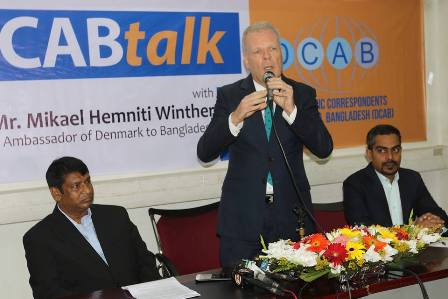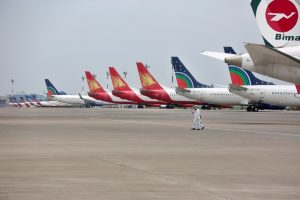Dhaka – Danish Ambassador to Bangladesh Mikael H Winther on Tuesday said they are still restricting their movement here as they still feel the risk of terror attacks even after 10 months of July 1 attack. UNB news agency reported
“We still have lot of restrictions on our own movements. In terms of risk assessment we still feel the risk. We still have a feeling that foreigners are exposed to that risk (terror attacks),” he told diplomatic correspondents.
The Ambassador, however, said the foreigners (diplomats) are ‘very happy’ with what the Bangladesh government is doing in terms of security arrangements since the July 1 terror attack on Holey Artisan Bakery in the city on foreigners.
He said they are comfortable ‘mentally, emotionally and psychologically’ since there had been no similar attacks since July 1.
Diplomatic Correspondents Association, Bangladesh (DCAB) arranged the interaction – DCAB Talk – at the Jatiya Press Club. DCAB president Rezaul Karim Lotus and general secretary Pantho Rahman also spoke on the occasion.
Asked to name a few countries where he feels the same risk, the Danish Ambassador said he can name 140 countries where there are risks at different levels except some countries where there are ‘good intelligence’.
Based on their security assessment, the diplomat said, they decide what they should do, what they can do and what they can not do.
Responding to a question on investment, Mikael Winther said he finds ‘quite a lower’ level of foreign direct investment (FDI) here compared to Bangladesh’s economic development and GDP.
“It’s quite low,” he said adding that even Danish investment in Bangladesh is much lower than what he expects.
Talking about the challenges of investment in Bangladesh, the Ambassador said there have been quite a lot of challenges that includes bureaucracy, infrastructure, corruption issues, challenges in governance, predictability in the regulations.
“So, it’s not always easy. We’re working very closely (with Bangladesh government) to address these issues,” he said.
Emphasising the importance of boosting happiness among common people removing poverty, Mikael Winther said social security, freedom of expression, trust, good governance; work-life balance, wealth and strong civil society are the key reasons why Denmark is a happy country.
Mikael Winther lauded Bangladesh saying since its independence, the country has made remarkable progress in terms of reducing the number of people living below the poverty line.
“Bangladesh has made remarkable progress since then (independence) – for instance in terms of reducing the number of people living below the poverty line – and has good reasons to be proud of many of the achievements that have been made,” he said.
Mikael Winther said Bangladesh is slowly turning into a trading partner rather than an aid partner. “The two-way trade between Bangladesh and Denmark has doubled since 2011.”
Export from Bangladesh to Denmark is dominated by garment items which makes up 92 percent of total import value from Bangladesh, said the Danish envoy.
He also said more than 70 Danish companies have established their business in Bangladesh in the form of either FDI or joint venture or setting up a liaison office in Bangladesh.
Winther said bilateral relations between the countries have been further strengthened with the opening of the first ever Bangladeshi Embassy in Copenhagen last year.
Mentioning Denmark’s help Bangladesh people improve income and food security, the Ambassador said, “Denmark is a longstanding development partner of Bangladesh. We believe in an inclusive, pro-poor and sustainable growth approach as well as promotion of human rights.”
He also put emphasis on sharing expertise, knowledge and technology from Danish experts within the area of green growth that can benefit Bangladesh.
Denmark’s current Development Programme for Bangladesh has also been formulated to respond to Bangladesh’s overall development priorities as reflected in the Government’s Vision 2021 and the 7th Five-Year Plan (7 FYP) while matching Danish policy priorities, it added value and past development experiences.
The Country Programme is also designed to support Sustainable Development Goals to be achieved by 2030.
Denmark recently held the Green Growth Solutions conference in partnership with Bangladesh’s Ministry of Foreign Affairs where more than 200 participants from private sector, government, donors, academia and civil society reached a consensus on the urgency of green transition and reflections on how Danish experience and solutions presented might be relevant and adapted in the context of Bangladesh.




